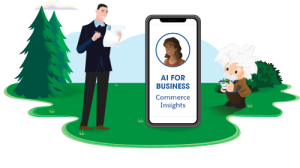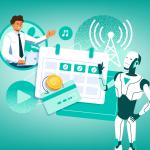Artificial intelligence (AI) is a prominent part of our daily lives. In business, AI is used to power:
- Financial robo-advisors
- Predictive algorithms
- Image recognition programs
- Robot-assisted surgeries and more
AI’s use is increasing across all industries and even traditional businesses are finding innovative ways to use artificial intelligence. Before we dive into how artificial intelligence is affecting businesses globally, let’s review the basics: what is artificial intelligence?
What is artificial intelligence?
Artificial intelligence is a broad term that refers to any type of computer software that engages in human-like activities, such as:
- Learning
- Planning
- Problem-solving
- Forecasting
When presented with the same information as a human, artificial intelligence has the ability to make similar decisions, so the technology is a simulation of intelligence. Here are a few examples of how businesses utilise artificial intelligence:
- Identifying industry trends
- Analysing customer data and interactions
- Making business predictions
- Automating workflows
- Providing data-driven suggestions
One way to think of AI is as a superset of capabilities encompassing several technologies. Of these, the primary technologies used in business are:
Machine learning
Machine learning uses complex algorithms that allow a computer to learn from data and develop analytical models. This technology uses other disciplines, such as statistical analysis, physics and operations research, to create these insights. The key component of machine learning is that the machine isn’t programmed to work a specific way, but rather teaches itself patterns through an iterative process.
Neural networks
Neural networks mimic the way a human brain works by using interconnected nodes in the same way the brain uses neurons. Each unit applies to a relatively simple process or calculation and then passes the input onto another layer, which applies another calculation, and so on. Each layer learns from the input of the previous one, leading to connections and insights that one pass couldn’t achieve.
Deep learning
Deep learning leverages large neural networks with numerous layers or depths. Deeper networks and advanced capabilities allow the network to develop complex patterns from massive data sets.
Rules-based systems
Rules-based systems are a foundational discipline that uses logic statements, primarily if-then and true-false statements, to establish a system based on predetermined rules.
Predictive analytics
Predictive analytics applies statistical techniques to predict causal relationships. Predictive analytics is a well-established concept, but its capabilities are enhanced in AI.
Pattern recognition
Pattern recognition allows AI to classify and interpret input from its surroundings. These may involve natural language processing, such as Amazon’s Alexa smart home devices, and computer vision that uses a machine to analyse environmental input and glean insights.
The combination of these technologies creates a system of capabilities that allows AI devices to become cognitive and respond in a human-like fashion to their environment without human intervention.
AI roles in business
AI is working its way into numerous industries and business roles as more of its capabilities are realised and refined. Here are some examples:
Financial analysis
AI shows a lot of promise for financial analytics. The technology is currently used in applications like Google Analytics, and the ability to read monetary results and relate them to specific business decisions is a capability that would benefit many businesses.
Help desk
Online help centres already use AI in the form of chatbots that direct you to another area of a site. If AI is integrated with voice-activated capabilities, companies can use AI to replace help desks and call lines.
Market research
Analytics is taking AI into all types of business fields besides finance, particularly marketing. By analysing the data of consumer trends and the performance metrics of marketing campaigns, AI can be used to develop a more effective marketing strategy. AI’s ability to learn, paired with the lack of the human fatigue element, can create a system with more accurate data-based insights than a human.
Trend prediction
With trend prediction, all data is compiled and analysed at one time, giving users the most logical solution. Trend prediction is already in use in certain industries, but marketing can use it to tactically plan the most successful and effective campaigns before putting a budget into them.
Planning
AI is in use as a tool to manage schedules, benefits, payroll and administrative tasks, so the next step would be planning and self-organising. This could free managers or human resources representatives to handle other aspects of the job that require a human touch.
Learn more about how AI is transforming CRM with smart predictions, intelligent recommendations, and timely automation.
What are the benefits of artificial intelligence?
AI’s ability to analyse data and provide actionable insights is a game-changer. Artificial intelligence has already transformed the consumer experience. Anyone who’s used Netflix, Amazon, Uber or Google can attest to that. The benefits of AI in customer service are becoming clearer by the day. In fact, 83% of IT leaders claim that artificial intelligence is transforming customer engagement.
Another benefit of artificial intelligence is that it can help with identifying external security threats, identifying internal security threats, and drawing important insights. This is essential during a time when customer data and private information are constantly being threatened by cybercriminals.
Artificial intelligence in the real world
In the real world, artificial intelligence is used to:
- Tackle rare forms of diabetes
- Fly commercial aircraft
- engineer the ideal car
- Stop online hate speech
- Predict the stock market
- Provide the perfect movie recommendation
It’s also helping businesses find new and better ways to connect with their customers. Expectations, personalised engagement, and service are all increasing, thanks to artificial intelligence.
AI can also automate routine tasks, freeing up the workforce to concentrate on their customers. And AI’s ability to take on other tasks is only expected to grow: autonomous school buses will ferry our kids to school, robot security guards will patrol our docks, and the docks will be packed with factories and warehouses staffed by robotic line workers.
These are just some of the potential impacts of artificial intelligence: even the most prescient sci-fi writer has no idea how AI will ultimately change our world.
Adjusting to an AI-driven future
Artificial intelligence is beginning to make what was once considered impossible possible, such as driverless cars. This is only a possibility because of accompanying technology, such as fast graphics processing units. With the impact of digital transformation, the applications for artificial intelligence software will also increase.
So how can companies get ready for an AI-driven future? They can start by implementing AI technologies that empower their workforce, rather than replace them. Salesforce Einstein provides deep data insights and enables sales teams to focus on sharpening the skills that AI can’t replicate: creativity and compassion.
With Einstein, businesses can leave the mundane tasks to the machines, and turn their human teams into highly driven, highly trained forces of nature. The age of the machines might not be here just yet, but for IT leaders, the time to act is now.
To read more about how AI is set to reshape the business landscape, download the Salesforce Enterprise Technology Trends Report.




















